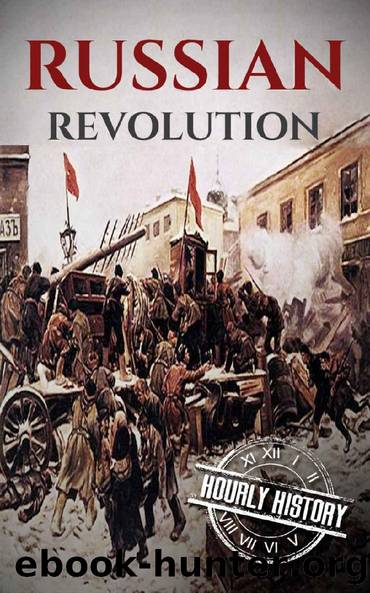Russian Revolution: A Concise History From Beginning to End (October Revolution, Russian Civil War, Nicholas II, Bolshevik, 1917. Lenin) (One Hour History Revolution Book 3) by Hourly History

Author:Hourly History [History, Hourly]
Language: eng
Format: epub
Publisher: Hourly History
Published: 2016-05-29T00:00:00+00:00
âVladimir Lenin
Vladimir Ilich Ulyanov was a young man headed to study law when his older brother Alexander was arrested on accusations of plotting the assassination of the Czar Alexander III as part of a radical group. His role in the plot had been to make the bomb that was to be used in the attempt. Alexander was later convicted and executed by hanging along with his co-conspirators. Influenced by Alexanderâs death, Vladimir began studying some of the radical ideas that had led his brother to make his disastrous assassination attempt. When he arrived at Kazan University, he joined an agrarian socialist revolutionary group and became the elected representative of the illegal and secretive Samara and Simbirsk zemlyachestvo, a social club for men hailing from the same part of the country.
Because of his brotherâs conviction as a traitor and assassin, Vladimir was closely watched by officials around Kazan University. When he participated in a strike over a minor university student policy, he was arrested under suspicion of having been the leader of the protestors. As punishment, he was expelled from the university and forced to continue his studies as an external student. He now used his study time to read widely. He was particularly inspired by Nikolay Chernyshevskyâs novel What is to be Done? and Karl Marxâs book Capital. He was able to take his exams as an external student with the University of St. Petersburg and achieved a first-class degree with honors.
After graduating, Vladimir continued to participate in the Russian Socialist movement. He travelled around Europe to meet with other socialist groups, specifically the Emancipation of Labor group in Finland. A prolific writer, he created and distributed revolutionary pamphlets to factory workers. He collected illegal revolutionary publications from the European nations he visited and smuggled them back into Russia for distribution. For his work, he earned a high-ranking position in the Social Democrats group.
Vladimir was eventually arrested and charged with sedition for his involvement with a socialist propaganda piece, The Workerâs Cause. After waiting a year in prison for his sentencing and cursory trial, he was finally exiled to Siberia. In exile, he continued writing political pamphlets anonymously and under many pseudonyms. Most notably, this is when he began using the name Lenin, under which he would achieve his greatest success. This was also the time when Leninâs beliefs on socialist philosophy diverted from the teachings of Karl Marx. While Marx had predicted a middle-class revolution as a necessary precursor to a socialist revolution of the working class proletariat, Lenin was convinced the workers of Russia could successfully throw off the Imperial regime without rebellion in the middle-class. He was also convinced he could speed the process.
When The Great War broke out in 1914, Lenin was traveling in Galicia, in the Austro-Hungarian Empire. As a Russian citizen he was briefly imprisoned under suspicion of working for the Russian government, but was released when his anti-regime history was established. He was vehemently against Russiaâs involvement in the war. He viewed the
Download
This site does not store any files on its server. We only index and link to content provided by other sites. Please contact the content providers to delete copyright contents if any and email us, we'll remove relevant links or contents immediately.
| Africa | Americas |
| Arctic & Antarctica | Asia |
| Australia & Oceania | Europe |
| Middle East | Russia |
| United States | World |
| Ancient Civilizations | Military |
| Historical Study & Educational Resources |
Rasputin by Joseph T. Fuhrmann(561)
Russian Revolution: A Concise History From Beginning to End (October Revolution, Russian Civil War, Nicholas II, Bolshevik, 1917. Lenin) (One Hour History Revolution Book 3) by Hourly History(334)
The Russian Revolution: A Very Short Introduction (Very Short Introductions) by S. A. Smith(333)
FROM RUSSIA, WITH LOVE by Ian Fleming(323)
Moscow Monumental by Katherine Zubovich(321)
The Russian Five by Keith Gave(310)
Reconstructing Lenin: An Intellectual Biography by Krausz Tamás(304)
Authoritarian Nightmare by John W. Dean & Bob Altemeyer(300)
Winter is Coming by Gary Kasparov(297)
Kremlin Rising by Peter Baker(274)
Io dirò la verità by Germano Maifreda(259)
Spetsnaz: The Inside Story of the Soviet Special Forces by Viktor Suvorov(244)
Russia Resurrected by Kathryn E. Stoner;(235)
My Further Disillusionment in Russia by Emma Goldman(233)
Voices From Stalingrad by Bastable Jonathan;(228)
13 KGB by Unknown(218)
The Russian Revolution in Ukraine (March 1917 â April 1918) by Nestor Makhno & Nestor Makhno(213)
Jihad and Death by Roy Olivier;(201)
Russian Revolution, 1917 (9781108109161) by Wade Rex A(188)
